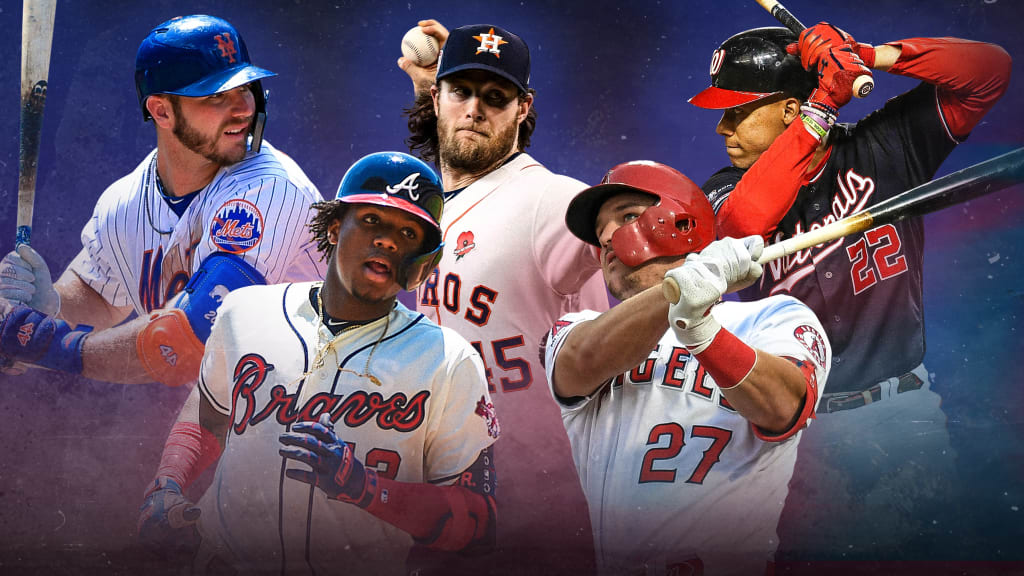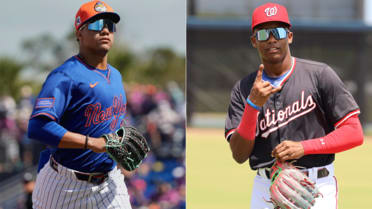
It was a fun year in baseball and these are the stats that defined it.
We looked at the most bonkers baseball stats twice along the way -- once at the beginning of September, and again at the end of the regular season. But that was before a wild October. So before the calendar flips to 2020, let's take one last look at MLB by the numbers in 2019.
Here are 19 crazy stats for '19.
1 in 1,420
What better place to start than with the champs?
The 2019 season ended with the Nationals winning the franchise's first World Series championship. The craziest thing about that World Series? The road team won all seven games. It was the first time in 1,420 best-of-seven postseason series across MLB, the NBA and the NHL that the road team won every game. Based on the visiting team historically winning 46 percent of games, the rough odds for the road team winning all seven World Series games would be ... 0.43 percent.
19-31
The Nats' record through 50 games -- the slowest 50-game start in history for a team that came back to win the World Series. The previous mark for worst start by a World Series champion was established more than a century earlier, by the 1914 Boston Braves, who were 20-30 through 50 games. In the Wild Card era, which began in 1995, only one other team had even made the postseason after starting as slowly as the 2019 Nationals. The 2005 Astros were 18-32 before making the playoffs as the National League Wild Card.
The Nationals went from 12 games under .500 on May 23, to 24 games over .500 by season's end (they finished 93-69), to world champions. Pretty remarkable.
1.46
Stephen Strasburg's career postseason ERA after this year, when he became the first pitcher to go a perfect 5-0 in a single October and won World Series MVP for the Nats. Strasburg’s postseason ERA ranks fifth all time (min. 50 innings) behind four Hall of Famers: Mariano Rivera (0.70), Sandy Koufax (0.95), Christy Mathewson (1.06) and Eddie Plank (1.32).
2.60, .417
Two numbers that encapsulate 21-year-old phenom Juan Soto's brilliant postseason for Washington.
The first is the combined ERA of the four pitchers Soto homered off in the 2019 postseason: Gerrit Cole (2.50), Justin Verlander (2.58), Hyun-Jin Ryu (2.32) and Clayton Kershaw (3.03). That’s three of this year’s final four in American and National League Cy Young Award voting, plus Kershaw, who already has three career Cy Young Awards.
The second is Soto's batting average in the Nationals’ three winner-take-all playoff games -- which featured Soto hitting a go-ahead single off Josh Hader in the eighth inning of the NL Wild Card Game, a game-tying home run off Kershaw in Game 5 of the NL Division Series and an insurance-run single off Roberto Osuna in Game 7 of the World Series.
25
Gerrit Cole's consecutive starts without a loss from May 27 through Oct. 15, until the Nationals finally beat the Astros' right-hander in Game 1 of the World Series. Cole won 19 consecutive decisions during that stretch, unofficially tying Hall of Famer Rube Marquard for the longest win streak by a pitcher in history (all 19 of Marquard’s victories came during the 1912 regular season). Across those 25 starts, Cole had a 1.59 ERA and 258 strikeouts.
373
Cole's 2019 strikeout total, spanning both the regular and postseason. That’s the fifth-highest single-year total by any pitcher in modern history, trailing only Randy Johnson (419 in 2001, 375 in 1999), Sandy Koufax (411 in 1965) and Nolan Ryan (383 in 1973). Cole’s 39.9 percent strikeout rate in the regular season marked the highest in MLB history, and in October he and Strasburg tied for the second-highest strikeout total (47) in a single postseason.
2
Gerrit Cole wasn't the only ace in Houston, and it was his teammate Justin Verlander who came away with the AL Cy Young Award. This stat refers to how Verlander capped his dominant 2019 season -- by joining both the 300-season-strikeout club and the 3,000-career-strikeout club in his final start. Two is the number of pitchers who have reached both of those milestones in the same game: Verlander this Sept. 28 and Randy Johnson on Sept. 10, 2000.
Verlander's 300 strikeouts in '19 marked a career high at age 36. He's one of just three pitchers in the modern era with a 300-strikeout season at that age or older, along with Johnson (who had three) and Nolan Ryan. Verlander and Cole also became just the second pair of teammates with 300 strikeouts in the same year, after Johnson and Curt Schilling for the D-backs in 2002.
92.5
More pitching here. This stat is Jacob deGrom's average slider velocity, in miles per hour, for the 2019 season. Yes, you read that right. deGrom's slider was the hardest one thrown by any starting pitcher in the pitch-tracking era, which goes back to 2008. There were 136 starting pitchers in '19 whose fastballs were slower than deGrom's slider.
deGrom's single hardest slider of the season? 95.4 mph. He threw three sliders 95 mph or harder. That's insane. No wonder the guy won his second straight NL Cy Young Award.
And speaking of velocity …
93.1
The average fastball velocity in Major League Baseball reached 93.1 mph in 2019, breaking the 93-mph mark for the first time in the pitch-tracking era. Your average big league heater is getting harder and harder. In 2018, it was 92.7 mph. At the start of the pitch-tracking era, it was 91.4 mph. MLB fastball velocity has jumped nearly two full miles per hour over the last 11 years.
There were 149 different pitchers in 2019 with an average fastball velocity of 95 mph or harder. There were only 55 of those pitchers in 2008.
0.91
Jack Flaherty's second-half ERA for the Cardinals, the second lowest ever for a pitcher with at least 15 starts in the second half. Flaherty and Jake Arrieta, whose 0.75 ERA for the Cubs in the second half of 2015 propelled him to the NL Cy Young Award, are the only pitchers with a mark under one. The 24-year-old allowed just 10 earned runs in 99 1/3 innings down the stretch, leading the Cardinals to the NL Central title.
Now let's get to some hitters.
72.5
Mike Trout's career Wins Above Replacement (WAR) after his third MVP season in '19 -- a crisp 0.1 WAR ahead of soon-to-be Hall of Famer Derek Jeter's career total. Trout's 72.5 WAR are the most ever by a position player through his age-27 season, ahead of Ty Cobb's 69.0. Trout is already one of 11 three-time MVPs in baseball history, and he and Stan Musial are the only two players with three MVP Awards by age 27.
118.3, 474, 42, 53
For all the home runs hit in 2019, only one player got to 50. Pete Alonso slugged his way to the MLB home run crown and the NL Rookie of the Year Award, smashing more than one record along the way. "Polar Bear" Pete set the MLB rookie home run record and the Mets' single-season record, and he also hit the Mets' hardest and longest homers since Statcast began tracking in 2015.
It took Alonso just 12 games to hit the Mets' hardest homer, a 118.3-mph shot on April 11 that also ended up tied for the hardest homer in MLB for the season. Then he crushed a 474-foot home run on July 17, the Mets' longest homer under Statcast tracking.
On Aug. 27, Alonso hit his 42nd homer of the season, breaking Carlos Beltrán and Todd Hundley's single-season franchise record. And on Sept. 28, the penultimate game of the season, Alonso set a new Major League rookie record with No. 53, breaking Aaron Judge's mark of 52 set in 2017.
18
NL MVP Cody Bellinger’s homer total in lefty-lefty matchups, making him just the 10th left-handed hitter on record with that many same-side home runs in a single season. No lefty had hit that many homers against left-handed pitchers since David Ortiz in 2006, and the last to top Bellinger’s total was Barry Bonds (21) in 2002.
Bellinger both tripled his home run total against lefties from the year before and raised his OPS against lefties by more than 300 points (from .681 in 2018 to .982 in '19).
61
Christian Yelich's homer total in the 162-game span from the 2018 All-Star break through July 28, 2019 (including 36 in his first 97 games in 2019). According to FanGraphs, a ridiculous 38.1 percent of Yelich’s fly balls -- nearly two of every five -- went for homers during that time. Since those records were first tracked in 2002, Ryan Howard (39.5 percent in 2006) is the only hitter to top that homer-to-fly ball ratio over a full season.
41/37
Braves phenom Ronald Acuña Jr.'s home run/stolen base combination as a 21-year-old in 2019, making him the youngest of the 13 players with 40 homers and 30 steals in a season -- Alex Rodriguez did it at age 22 in 1998. Acuña fell just short of becoming the fifth 40-40 club member, but if 40-35 were a club, he'd be one of five players in that, too, along with Barry Bonds (twice),
Alfonso Soriano, A-Rod and Jose Canseco.
41 and 38
Nelson Cruz's home run total and age, respectively, in 2019. Cruz is one of just four players in MLB history with a 40-homer season at age 38 or older, along with Barry Bonds (2003 and '04), Darrell Evans (1985) and Hank Aaron (1973). Cruz and Bonds are the only two with more than 40 homers in a season at that age.
61
The home run total for Yankees hitters against the Orioles, a record for a team against a single opponent in one season. Yes, the 2019 Yankees were basically Roger Maris when hitting against the Orioles.
Seventeen different Yankees went deep against Baltimore -- from Gleyber Torres (13!) to Gary Sánchez (10 in just 14 games) to Greg Bird, Thairo Estrada and Troy Tulowitzki (one apiece). Meanwhile, the Orioles featured 18 different home run hitters all year. Their pitching staff surrendered an MLB-record 305 home runs on the season.
6,776
The record-setting number of home runs hit in MLB in 2019 -- 671 more than the previous record of 6,105 set in 2017. In the year of the home run, a record 549 different players went deep, and a record 129 players hit at least 20 homers. That more than doubled the number of 20-homer hitters from just four years ago (there were 64 in 2015), and 38 of those players reached 20 dingers for the first time.
1,180
The combined home runs hit by the top four teams -- the Twins (307), Yankees (306), Astros (288) and Dodgers (279) -- who all broke the previous single-season team home run record. The 1997 Mariners had held that record (264) for two decades before the Yanks opened the floodgates with 267 in 2018.
Andrew Simon is an editor and writer for MLB.com.
Matt Kelly is a reporter for MLB.com based in New York.
David Adler is a reporter for MLB.com based in New York.




